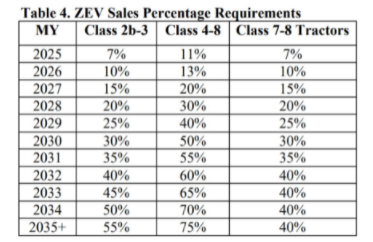As it aims for Massachusetts to phase out sales of traditional gas-powered medium- and heavy-duty vehicles over the next three decades, the Baker administration is adopting greenhouse gas emissions standards and regulations from California meant to accelerate the switch to electric vehicles.
The Department of Environmental Protection last week filed emergency regulations and amendments to immediately adopt the Golden State’s Advanced Clean Trucks (ACT) policy, which requires an increasing percentage of trucks sold between model year 2025 and model year 2035 to be zero-emissions vehicles. DEP’s amended regulations also incorporate California’s revisions to greenhouse gas standards for model year 2025 and a “Heavy-Duty Omnibus Regulation,” to establish lower greenhouse gas and nitrogen oxides emissions standards for conventional trucks and heavy-duty vehicles.
The administration said the adoption of California’s regulations, which is required in certain circumstances under Massachusetts law, will help reduce pollution that harms the environment, promote the adoption of electric trucks and “lead to reduced fuel consumption and fuel costs and maintenance due to more fuel-efficient engines and vehicles and next-generation zero-emission trucks.”
“Massachusetts continues to take aggressive action to reduce emissions from the transportation sector, and addressing pollution from medium- and heavy-duty vehicles and advancing the market for clean trucks is an essential part of this effort,” Energy and Environmental Affairs Secretary Kathleen Theoharides said. “Reducing emissions from trucks will help support public health by improving air quality, reducing the risk from exposure to toxic diesel pollution, and reducing emissions that contribute to climate change.”
Emissions from transportation totaled an estimated 30.8 million metric tons of carbon dioxide equivalents in 2018, more than any other single sector and equal to roughly 42 percent of all emissions that year, DEP said. Baker administration energy officials have said that medium- and heavy-duty vehicles account for about 14 percent of the greenhouse gas emissions in Massachusetts. The transportation sector is one of a handful for which the Baker administration must establish legally binding 2025 and 2030 emissions sublimits by July 1.
DEP said in a summary of the changes that the adoption of the California regulations is projected by 2050 to lead to a 51 percent reduction in regional medium- and heavy-duty vehicle nitrogen oxides emissions, a 23 percent drop in particulate matter emissions and a 53 percent reduction in greenhouse gas emissions compared with today’s levels.
The Massachusetts Clean Air Act requires that the Bay State “shall adopt motor vehicle emissions standards based on the California’s [sic] duly promulgated motor vehicle emissions standards” unless DEP determines, after a public hearing and based on “substantial” evidence that emissions standards and a compliance program similar to California’s “will not achieve, in the aggregate, greater motor vehicle pollution reductions than the federal standards and compliance program.”
DEP said that its analysis of the California regulations concluded that they “are clearly more stringent and provide, in the aggregate, greater emission reductions than the current federal program, and therefore must be adopted by MassDEP.” The regulations were filed Dec. 30 on an emergency basis, the agency said, because they must be in place two years before the first affected model year begins. Model year 2025 starts Jan. 1, 2024.
Members of the public will have a chance to weigh in on the changes during a Feb. 1 virtual public hearing and can submit written comments via email to ngoc.hoang@mass.gov until 5 p.m. on Feb. 11, DEP said.
DEP acknowledged that the amendments “will increase the upfront cost of new [medium- and heavy-duty] vehicles” but said the owners of those vehicles will realize savings over time from having switched to a zero-emissions vehicle. In all, the changes are projected to lead to costs of $1.054 billion by 2050, the agency said.
The amended regulations are also expected to lead to health care cost savings “in the range of $363 million to $818 million from 2025 through 2050, with the majority of benefits due to avoided premature deaths, avoided hospitalizations for cardiovascular illness and avoided emergency room (ER) visits,” the administration said.
“In addition to reducing criteria pollutant emissions and GHG, the regulations will lead to reduced fuel consumption and fuel costs due to more fuel-efficient engines and vehicles, and next generation zero emission trucks, which will positively affect consumers, most businesses and fleet owners,” DEP said.
Zero-emission vehicles are a major part of the Baker administration’s strategy to meet reduced greenhouse gas emissions goals. The 2050 decarbonization plan the administration released in late 2020 said that reducing greenhouse gas emissions by 45 percent from 1990 levels by 2030 — the administration’s goal before a climate law set the required 2030 reduction at 50 percent — would “require that about 1 million of the 5.5 million [passenger vehicles] projected to be registered in the Commonwealth in 2030 be” zero-emission vehicles.
In coordination with more than a dozen other states, Massachusetts has already set a goal that at least 30 percent of all trucks sold by 2030 and 100 percent of trucks sold by 2050 be zero-emission vehicles.

